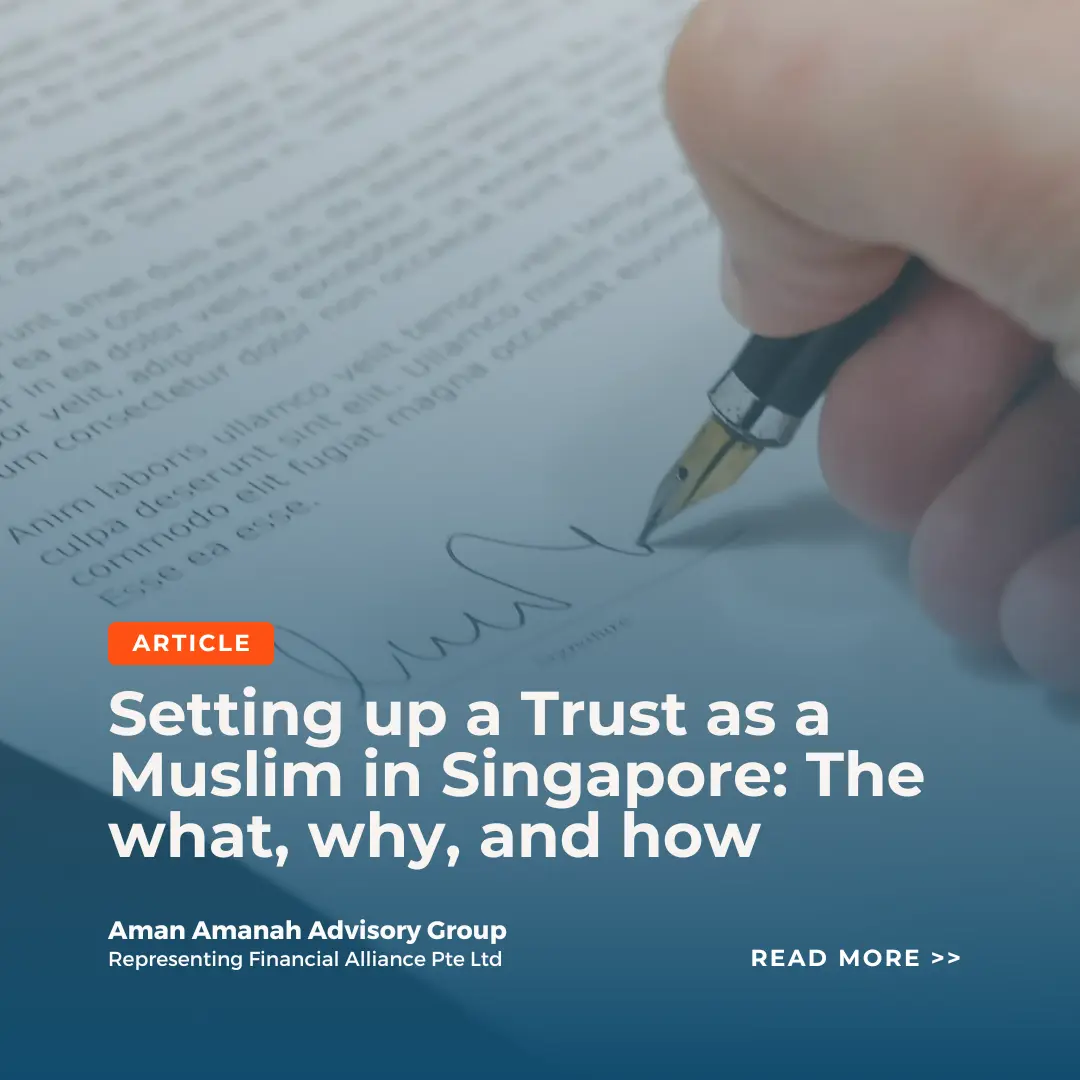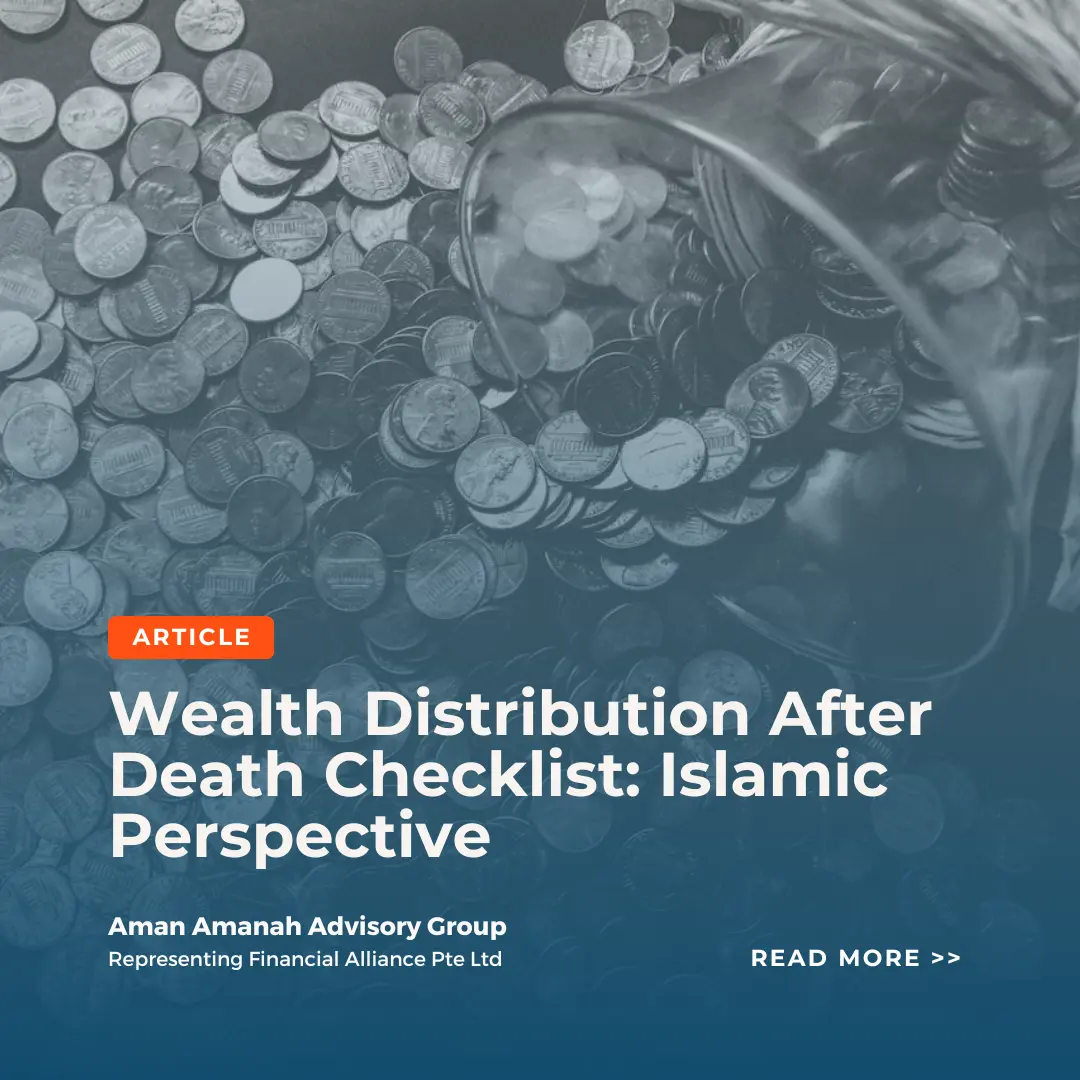Most of us Muslims roughly understand that when we pass away, our estate is distributed through faraid and additional wealth distribution instruments such as Hibbah and wasiat. There’s another instrument that we Muslims in Singapore should consider when thinking about our wealth planning after death – Trusts. It can be used to decide and facilitate the distribution of your assets to specific people, with specific conditions decided by you, and with no limit to the amount.
In this article, we will be talking about the following:
- What is a Trust
- The different forms of trusts
- How a trust is permissible
- Why you should consider setting up a trust
- Who specifically would benefit from setting up a trust
What is a trust?
Definition of a trust
It is a legal arrangement that enables you as an individual (the settlor) to put your assets such that a trustee that you appointed can administer and manage them for the benefit of others (your beneficiaries). The type of assets include cash, stocks, property, and family business. The type of beneficiaries may consist family members, friends, or charitable organisations. There are different types of trusts. Your trustee has a statutory obligation to act in your beneficiaries’ best interest.
After reading the above definition, you may find it sound similar to other terms used in Islamic wealth distribution. Let’s clarify the difference first before we proceed.
Trust vs Hibbah
Trust sounds very similar to Hibbah. According to MUIS’s website, Hibbah is a gift in physical form (such as cash or property) and is generally used to honour someone. You must arrange for this while you are mentally sound.
Based on this definition, it is similar that you are gifting a portion of your assets to someone. Even though Hibbah is recognised by MUIS, it is not 100% secure, as it can be contested (someone can argue that the Hibbah is not valid). Whereas with a Trust, the Hibbah can be ensured that is recognised and properly executed. In addition to that, Hibbah is not confidential but a Trust is. This means that only the trustee and the beneficiaries know the terms and the assets given through the trust.
Trust vs Wasiat
The following is the definition given by MUIS:
“This is a legal document that you sign while you are mentally sound to express your wishes on how one-third of your estate is to be distributed after your death. It can also include the name of your appointed executor who will distribute your assets according to your wishes.”
Before we compare them, one important thing that needs to be understood is that for Trusts, whatever assets that have been placed in it, cannot be included in the estate that would be distributed through a wasiat and faraid. For example, you have $1,000,000 in wealth, when you are living, you decided to place $500,000 in a trust, hence $500,000 is the remaining amount that will be distributed through wasiat and faraid upon your death.
When comparing wasiat and trust, both are similar in how you can decide who you would like to receive your estate and how much of it. Both are also set up while you are alive. However, there are some differences:
Firstly, the limit of the amount you can decide to give to the person. For wasiat, you can only give the people a third of your estate, the rest has to be distributed through Faraid). While with a trust, you have the freedom to decide however much you would like to give to an individual.
Secondly, trust can have conditions to the distribution of the assets to the beneficiaries while wasiat can’t. For example, you have a child and you worry that they may be receiving a share of your wealth at a very young age and may squander it. So to ensure that the inherited wealth is not squandered away, you place a condition that is slowly given out after your child turns 18 over 5 years. You can include any condition that you would prefer that is reasonable.
Different types of trust
Testamentary Trust (Haram)
According to Singapore Family Lawyer, a Testamentary Trust in Singapore, also known as a will trust, is a legal arrangement effective only after the trustor’s (the person who creates the trust) death. The trust outlines how the trustor’s assets will be managed and distributed posthumously. It has to go through the Grant of Probate process.
It is permissible for Muslim only if it follows the Islamic Law of Inheritance, where it cannot be more than a third of the estate.
Statutory Trust
A statutory trust is created by the operation of law where a trust is automatically created to protect the interest of a minor under a wasiat or intestacy. It is usually used when both parents pass close together and they have young children.
Living Trust
Based on Investopedia, A living trust is a legal arrangement used in estate planning and set up by someone (settlor) during their lifetime. It designates a trustee and provides explicit directions for the distribution of assets after the death of the grantor. A trustee manages assets in a trust according to beneficiaries’ best interests. It takes effect immediately when the trust is signed.
This is a permissible form of trust and the form of trust that we recommend.
Is setting up a trust permissible?
The reference for saying it is permissible and which type is permissible
According to the Fatwa Committee Islamic Religious Council of Singapore:
“Based on the above considerations, the Fatwa Committee has decided that the pledging of the wealth to the SNTC Trust by the parents or caregivers of a person with disability is permissible. This trust is an instrument of wealth transfer that is different from the instruments contained in the classical fiqh, but is in line with the objectives of shariah (maqasid shariah). It is hence a special trust hibbah (hibbah amanah khas) and does not have to comply with the rules of faraidh.”
The conditions for it to be permissible
Setting up a living trust is permissible when the following conditions are met:
- Advice and approval from qualified shariah advisors
- The nature of the assets eligible to become trust assets
- The assets must be valuable in Islam. It must not go against Maqasid Shariah and is halal.
- The management of the trust assets
- It should follow the Islamic investment guidelines where there should be channelling of any impermissible amount arising from investment to charities. This is because nothing right now is 100% Shariah-compliant, anything that is not, we need to give it to charity.
- The overall terms of the deed trust
- There must be periodic Shariah reviews and Shariah audits for the trust. This is to ensure that the trust is Shariah-compliant
Why should they consider setting up a trust?
Understanding the living trust in Singapore context is crucial for both businesses and individuals to safeguard their assets and ensure the intended beneficiaries receive their assets and savings in a manner aligned with their wishes. Making informed decisions and proactive updates are key to ensuring financial security for loved ones.
A trust ensures proper distribution of your assets and benefits to loved ones when we pass and avoid disputes. If you never plan, Faraid comes in.
List of benefits of setting up a trust:
- Peace of mind: know that your loved ones will receive the intended benefits without complications
- Simplest yet sophisticated distribution tools: Avoid unnecessary hassle to the legal heirs and affords a quick solution for distribution. It is confidential – don’t need to tell other faraid beneficiaries
- Preserve assets:
- Strategic objectives: can choose who to control/manage your investments and assets
- Expertise: Use professional services from experienced managers, advisors, trustees
- Succession Planning: who to take over the business, etc.
Who should consider setting up a trust?
No living heirs
You have no children, parents, or relatives that would inherit your wealth upon your passing. In the situation that you do not do any form of preparation, all of your estate will be given to Baitul Mal. You can have a third of it distributed through a wasiat (will) but the rest will be given to Baitul Mal. Should you want more of your assets to be distributed to specific people you know upon your death and or with specific conditions, setting a trust would be beneficial for you.
Have children with special needs
Your child with special needs will inherit a portion of your estate but how can you ensure that they are taken care of and that their needs are met with the assets given to them? When your assets are distributed by faraid and/or wasiat, your special needs child gets the full amount but they have to manage themselves or someone in your family has to volunteer to help to manage that (if anyone volunteers). So, to ensure that your child with special needs is taken care of after your passing, set up a trust for them. They will be given the assets through a trustee will ensure the assets are managed as wanted by you (like for buying clothes, food, medical expenses, etc.)
All heirs are women and you want them to receive more
In the situation where all your heirs are women, there will still be a big chunk of your estate left after the distribution through faraid and wasiat. This surplus will be given to Baitul Mal. There’s no issue with giving it to Baitul Mal, it is good. However, if you want to ensure that these female heirs of yours receive a particular amount with specific conditions, then a trust would be beneficial.
In conclusion, if you want to ensure that your assets are distributed to specific people with specific conditions with specific amounts, a trust would be ideal for you. If you want to know more or need advice about this, please book a consultation with one of our Islamic Wealth Advisors.



